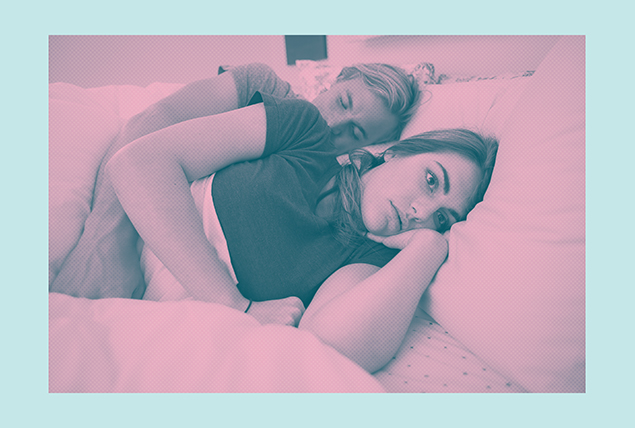Can High Cortisol Levels Lead to a Lack of Sex Drive?

Key Points
- Cortisol is often referred to as the "stress hormone," which means it can be responsible for many stress-induced complications.
- Signs that your cortisol levels are high include depression, anxiety, headaches, weight gain and a number of other symptoms.
- Lowering your cortisol levels can be accomplished through lifestyle changes, such as regular exercise, a healthy diet and quality sleep. Vitamins found in certain foods can help.
We know stress affects your sexual health, and cortisol is often called the "stress hormone." Could high cortisol levels, then, lead to a lost libido and a struggle to lose weight?
Let's see what the science says.
What is cortisol, and how does it affect my libido?
Cortisol is a lifesaving stress hormone. When we're under stress, our adrenal glands release cortisol into the bloodstream, raising blood sugar levels and elevating our heart rate so we have the energy for our fight-or-flight response.
This surge of cortisol release is intended to be short-acting, with the expectation our bodies will rest and recover afterward, according to Stacey Wood, R.D.N., a clinical dietician in Weatherford, Texas, and the owner of Virtual Dietitian.
High cortisol levels stimulate the liver to produce more sex hormone-binding globulin (SHBG), a protein that binds to testosterone and estrogen, making them less available to the body. It could result in decreased sexual desire and function.
"Chronic stress and elevated cortisol levels can cause fatigue and disrupt sleep, which can also impact libido and sexual interest," said Ann Hester, M.D., a board-certified internist and the author of "Patient Empowerment 101" in Glen Burnie, Maryland.
Women who had an increase in cortisol in response to sexual stimulation had a lower libido than women who showed a decrease in cortisol, a 2008 study suggested.
Does high cortisol cause weight gain?
"Abnormal weight gain or excessive abdominal fat may be signs of high cortisol levels, especially if the [person's] diet does not reflect the weight gain," said Cesar Sauza, R.D.N., a nutrition specialist at NCHC.org.
Other ways high cortisol levels can lead to weight gain, according to Hester, include the following:
- Slowing down your metabolism, making it easier to gain weight and harder to lose weight
- Increasing hunger
- Making you crave sugary, fatty, high-calorie foods
- Promoting fat storage in the abdominal area
- Causing muscle tissue breakdown, decreasing the resting metabolic rate
How do I know if I have high cortisol levels?
There are many potential signs of high levels of cortisol, and it's unlikely a person will experience all of them. The only way to know for sure is to visit your doctor, Hester said.
Your cortisol levels can be tested throughout the day with a saliva test, according to Wood.
Signs your cortisol levels might be high include:
- Chronic depression
- Chronic anxiety
- Chronic headaches
- Difficulty concentrating
- Inability to handle stress without feeling overwhelmed
- Decreased libido
- Weight gain
- Food cravings
- Muscle weakness
- Acne or skin infections
- High blood sugar
- Changes in fat distribution
- Thinning of the limbs
- Increased fat in the trunk
- Fatigue
- Disrupted sleep
- Moon face
- Mood swings
- Female balding
- Lethargy
- High blood pressure
- Insulin resistance
- Abnormal hair growth in women (hirsutism)
- Bruising
- Menstrual change
"If you notice any of these warning signs, it's important to speak with your doctor about potential testing for cortisol levels," said Mrinal Pandit, M.S., R.D., the clinical nutritionist at Oliva Skin and Hair Clinic in Pune, Maharashtra, India.
Recommended
- Is a Lackluster Sex Drive Ruining Your Life?: This sexual disorder affects millions of women, but you've probably never heard of it.
- Daily Masturbation Can Reduce Your Stress: Put aside your hangups about solo sex—it's for the greater good.
- How Can You Maximize Your Sexual Pleasure in Times of Stress?: The sky is falling. The end is nigh. How do you keep your cool when you're feeling hot?
How can I reduce my cortisol levels?
The best way to reduce cortisol levels is to make lifestyle changes that reduce stress, such as incorporating regular exercise, getting enough quality sleep, maintaining a healthy diet and taking time for yourself to relax, Pandit said.
Other ways you can lower your cortisol levels include:
- Practice deep breathing techniques or meditation
- Take warm baths
- Get seven to nine hours of sleep each night
- Limit screen time before bed
- Exercise regularly with a mix of aerobics, strength training and flexibility workouts
- Eat a healthy diet rich in whole foods, lean proteins and healthy fats
- Avoid excessive consumption of processed foods, caffeine and sugar
- Stay hydrated
How can I lower my cortisol naturally?
The most effective way to naturally reduce cortisol levels is to make adjustments to the four main foundations of health: sleep, nutrition, movement and pleasure, said Bria Gadd, a Phoenix-based holistic health coach who specializes in female hormones.
"When we laugh, orgasm and connect more deeply with our purpose, cortisol naturally lowers in the body," Gadd said.
What foods raise cortisol levels?
Anything high in sugar and preservatives raises cortisol levels, Wood said. High cortisol levels were associated with low-quality food choices from patients with type 2 diabetes, a 2011 study suggested.
Other foods that can boost cortisol levels include:
- Caffeine
- Soft drinks
- Alcohol
- Processed foods
- Processed flours
- Conventionally raised dairy
- Hydrogenated oils
- Fast food
- Junk food
What foods lower cortisol levels?
Foods with vitamin B5 (pantothenic acid), vitamin B6 (pyridoxine), vitamin C, chromium, magnesium and foods rich in omega-3 fatty acids might be able to help keep cortisol levels in check, according to Pandit.
Anti-inflammatory diets high in antioxidants and phytochemicals, such as the Mediterranean diet, can lower your cortisol levels, Wood said.
Examples of these foods include:
- Whole foods
- High-quality animal proteins
- Eggs
- Fortified cereals
- Flax seeds
- Salmon
- Sardines
- Tuna
- Olive oil
- Chia seeds
- Avocados
- Walnuts
Fermented foods
Fermented foods can lower cortisol levels by providing healthy probiotics for the gut, which reduces gut permeability by providing a well-balanced gut microbiome, Wood said.
Fermented foods include the following:
- Greek yogurt
- Sauerkraut
- Kimchi
- Kefir
- Kombucha
- Tempeh
- Miso
Theanine sources
Foods rich in theanine, an amino acid found in green tea and mushrooms, can reduce cortisol levels by promoting relaxation, improving sleep quality, and reducing feelings of stress and anxiety. Matcha green tea can reduce stress in animals, a 2018 study suggested.
Theanine can influence neurotransmitters in the brain, increasing the production of gamma-aminobutyric acid (GABA), which has relaxing effects, Hester said.
If you're getting theanine from green tea, be careful because the caffeine from the tea might affect your cortisol levels, Sauza said.
Vitamin C sources
Vitamin C is both good for the immune system and can indirectly influence cortisol levels. This vitamin is important for maintaining the health of the adrenal and pituitary glands that produce cortisol in response to stress.
Chronic stress can cause inflammation and boost cortisol levels, but vitamin C's anti-inflammatory properties might be able to provide a more balanced stress response, Hester said.
A diet rich in vitamin C could help treat anxiety and improve academic performance, a 2015 study indicated.
Foods rich in vitamin C include:
- Oranges
- Broccoli
- Kale
- Strawberries
- Peppers
What's the best approach to lower cortisol levels, lose weight and reclaim your libido?
There is no one-size-fits-all approach to lowering cortisol, losing weight and boosting your libido.
"Different people have different triggers. People should identify the factors that may raise their cortisol levels and work toward improving them," Hester said.
"The best approach to reducing cortisol levels, losing weight and reclaiming your libido begins with lifestyle changes," Pandit said.
Adding regular physical activity, a healthy diet, quality sleep and stress management to your life is a good place to start.
The bottom line
High cortisol levels can lead to weight gain and a decrease in your sex drive. The best way to lower your cortisol levels is to reduce your stress with improvements in your diet, exercise and sleep.
Cutting out processed foods, sugar and alcohol while adding in vitamin C, theanine and fermented foods can potentially help lower your cortisol levels over time.


















